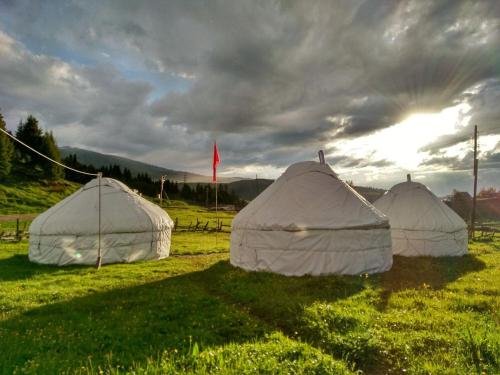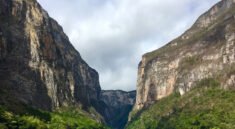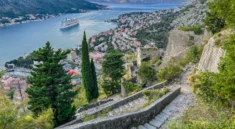
Nestled deep in the Tian Shan Mountains of eastern Kyrgyzstan, far from tourist throngs and city lights, lies a valley untouched by time and industrialization. Jyrgalan—once a Soviet-era mining village—has been reborn into a sanctuary of alpine meadows, authentic yurt camps, and raw nomadic heritage. It’s the kind of place where sheep outnumber people, the air smells of wild herbs, and you might go days without encountering another traveler. In this highland jewel, everything slows down: the pulse of life matches the rhythms of nature and tradition, and the modern world feels a thousand miles away.
Travelers in search of authenticity—those drawn not by monuments, but by stories, landscapes, and the warmth of shared meals inside felt tents—will find Jyrgalan an unforgettable destination. It’s not about flashy landmarks. It’s about deep conversations by the fire, hikes through flower-strewn pastures, and sipping fermented mare’s milk while snow-capped peaks tower in the background. This is Kyrgyzstan at its most genuine, and perhaps Central Asia at its most magical.
The Journey To Jyrgalan: A Road Less Traveled
Getting to Jyrgalan requires intention. The journey begins in Karakol, a lively town near Lake Issyk-Kul with Russian-style architecture and a strong outdoor community. From there, a 60-kilometer drive leads northeast through gradually ascending hills and winding roads into a world that feels increasingly remote and wild.
By the time you reach Jyrgalan village—home to just a few hundred residents—you’ll have left behind paved roads, tourist shops, and urban noise. The landscape opens to rolling green valleys framed by jagged peaks, dotted with livestock and the occasional yurt. What awaits is not just a destination but a transformation—into a slower, deeper kind of travel.
A Village Reimagined: From Mining Dust To Ecotourism Gem
In Soviet times, Jyrgalan was a coal mining settlement, thriving on extraction and labor. When the USSR collapsed, so did the local economy. Jobs vanished, families moved away, and the village teetered on the brink of abandonment.
But in recent years, a grassroots revival has taken place. Through the efforts of local leaders, NGOs, and passionate adventurers, Jyrgalan has rebranded itself as a hub of sustainable tourism and community-based hospitality. Guesthouses emerged, yurt camps were built, and trails were carved across the valley to welcome trekkers, skiers, and horse riders seeking unspoiled nature.
Importantly, this transformation is led by the villagers themselves. Tourism here benefits the community, supports conservation, and preserves the Kyrgyz way of life, rather than disrupting it.
Sleeping Under the Stars: Yurts And Guesthouses With Heart
There are few travel experiences as memorable as sleeping in a traditional yurt, warmed by a stove in the center, with blankets layered for warmth and mountain silence outside. In Jyrgalan, yurt stays are not tourist performances but real expressions of nomadic hospitality. Families welcome guests as if they were kin, sharing meals, stories, and tea rituals with quiet pride.
If yurts aren’t for everyone, guesthouses provide a cozy alternative. These family-run homes blend local charm with modern comforts—hot showers, home-cooked meals, and Kyrgyz carpets lining the walls. Whether in a yurt or a guestroom, you’ll feel a sense of belonging that can’t be bought.
At night, without city lights, the sky reveals itself in full glory. Stars blanket the heavens, constellations vivid and mesmerizing. Many travelers say the real luxury of Jyrgalan is this: clean air, deep silence, and sky unspoiled by progress.
Hiking Through High-Altitude Heaven
The Jyrgalan Valley is a dreamscape for hikers and trekkers. Trails lead in all directions—from half-day loops past waterfalls and flower-filled meadows to multi-day treks over mountain passes and into alpine lakes.
One of the most popular routes is the Boz-Uchuk Lakes trek, a 3- to 4-day circuit crossing roaring rivers, herds of semi-wild horses, and glacial landscapes where few people go. Another favorite is the Tulpar Tash day hike, offering panoramic views over the valley, and ending in a dramatic rock formation believed to resemble a mythical horse.
Summer transforms the valley into a carpet of wildflowers, while spring brings cascading rivers and lush greenery. In winter, the region becomes a backcountry ski haven, with deep powder and no ski lifts—just untouched slopes and adrenaline.
No matter the season, nature in Jyrgalan feels close, raw, and restorative. You don’t need to be an expert trekker; even gentle walks through the meadows can bring moments of profound awe.
Nomadic Heritage And Living Culture
The Kyrgyz are one of the few cultures on Earth to maintain a living nomadic tradition. In Jyrgalan, you don’t just observe it—you become part of it.
You may be invited to join a milking session at dawn, or watch as kumis (fermented mare’s milk) is prepared. Children herd sheep on horseback, families gather for plov (rice pilaf), and music—often played on a komuz, the traditional Kyrgyz lute—echoes through the valley in the evening.
Summer pastures, or jailoos, come alive with seasonal migrations. Livestock are moved higher into the hills, and temporary yurt settlements appear where herding families live without roads or electricity, relying on centuries-old knowledge and customs.
Guests who stay for a few days often end up helping with chores, learning local phrases, and forming bonds that linger long after departure. These are not “staged” encounters—they are authentic windows into a culture built on resilience, mobility, and harmony with nature.
A Culinary Experience Rooted In Tradition
Meals in Jyrgalan are as hearty as they are meaningful. Local cuisine is designed for life in the mountains: rich in protein, filling, and warming. Expect dishes like:
- Beshbarmak – boiled meat with handmade noodles
- Manti – steamed dumplings with lamb or potato
- Lagman – thick noodles in savory broth
- Boorsok – fried dough balls, served with jams and tea
- Shorpo – slow-cooked meat soup with vegetables and spices
Every meal is accompanied by unlimited tea, often infused with mountain herbs, served with sugar cubes and conversation. Sharing food here isn’t just about sustenance—it’s an act of hospitality, a cultural exchange that builds trust and memory.
Why Jyrgalan Is Different: Beyond Instagram
In an era of curated travel and oversharing, Jyrgalan stands apart as a place where presence matters more than pictures. There’s patchy phone signal, no souvenir shops, and barely any signage. What you find instead is stillness, sincerity, and surprise.
People come to Jyrgalan to disconnect from the digital world—and reconnect with the earth. There’s time to write, sketch, stargaze, reflect, or simply sit beside a river without needing to document the moment.
It’s not for everyone. If you need nightlife, fast Wi-Fi, or familiar brands, you might find the place too quiet, too slow. But for those willing to embrace discomfort in exchange for discovery, Jyrgalan offers travel in its purest form: real, rooted, and deeply rewarding.
Sustainable Tourism With Local Impact
Jyrgalan’s success in tourism is built on community-led initiatives. Homestays, trail development, guide training, and conservation efforts are all managed by locals, ensuring that the benefits of tourism stay in the valley.
Organizations like Destination Jyrgalan help coordinate treks, promote responsible travel, and connect visitors with families. Every som you spend goes toward sustaining education, infrastructure, and cultural preservation.
This model is rare in global tourism, where many remote regions are exploited for short-term gain. In Jyrgalan, you don’t just visit—you invest in a future where tradition and nature thrive.
Leaving But Not Forgetting
It’s difficult to leave Jyrgalan. The longer you stay, the more the rhythm of life gets under your skin: the pace of the horses, the sound of wind through alpine grass, the shared laughter over evening meals.
You’ll carry away not just photos of majestic peaks and yurt silhouettes, but a feeling—of humility, of wonder, of having touched a world still guided by the seasons, stars, and stories. And perhaps that feeling stays with you long after your return home, changing how you see travel, culture, and your place in the world.
Final Thoughts: Jyrgalan’s Quiet Magic
In the end, Jyrgalan is not just a location on a map. It is a living canvas of mountains and memory, of voices echoing through valleys and firelight flickering on felt walls. It is the smell of fresh bread, the sight of grazing yaks, and the handshake of a shepherd welcoming you into his world.
Surrounded by alpine meadows and yurt camps, Jyrgalan offers something truly rare: a chance to experience life—not as an outsider looking in, but as a guest who listens, learns, and becomes part of the story.
And in this age of fast travel and filtered reality, that might be the most profound gift of all.



